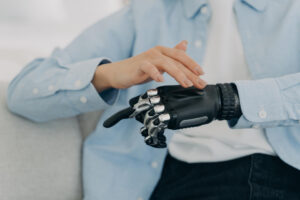Robots in elder care: are they the future of senior assistance?

Los robots de asistencia pueden complementar a los cuidadores humanos, ayudando en tareas rutinarias y brindando compañía a las personas mayores.
The shortage of healthcare workers and caregivers has reached critical levels in many countries, including the United Kingdom. In this context, technology, particularly robots and artificial intelligence, is gaining ground as a potential solution for elderly care. As the population ages and care needs increase, robots could become indispensable allies to ease pressure on human resources and improve the quality of life of older adults.
The idea that robots could play a role in caring for the elderly may sound like science fiction. However, advances in artificial intelligence and robotics are making this possibility increasingly real. In the UK, for example, the shortage of nurses and caregivers could exceed 250,000 vacancies by 2030. Faced with this situation, robots may play a crucial role in both home and hospital care, helping older people maintain their independence for longer.
Robots designed for elder care go beyond domestic tasks such as cleaning or cooking. Technology experts predict that in the future robots will provide social interaction, helping to reduce isolation among older adults living alone. Furthermore, studies already suggest that robots can help people with dementia remember to take medication or perform daily activities such as eating. These interactions can be essential in improving the quality of life of those facing cognitive challenges.
Benefits and concerns about the use of robots in care
Despite the clear benefits, the idea of replacing human caregivers with robots has sparked concern in some sectors. Skeptics fear that robotics could displace human workers, reducing job opportunities. However, experts agree that robots will not completely replace human caregivers but will act as complements. In trials conducted in nursing homes, for example, robots took on simple tasks such as providing entertainment and companionship for residents, allowing human caregivers to focus on more complex responsibilities such as administering medication or offering emotional support.
It is important to highlight that robots in the care field provide not only physical assistance but also emotional support. The companionship provided by a robot can be a key factor in improving the well-being of older adults, especially those with conditions that affect their social abilities, such as dementia. In this way, robotics can contribute to more dignified and independent aging for many people.
Technology as an ally in elder care
In a world where technology plays an increasingly central role, robots and other innovations such as medical alert devices are already transforming elder care. The Careline alarm service is a clear example of how technology can enhance safety and well-being for older adults. This service allows users to request help at any time by simply pressing a button on a portable device, immediately connecting them with a team of human professionals who provide the necessary assistance.
The integration of technology into elder care not only improves efficiency but also provides peace of mind for families who know their loved ones are well supported. By assigning robots to repetitive and tedious tasks, human caregivers can focus on offering more personalized and emotional care, which is essential for the overall health of elderly individuals.
As the global population ages, prioritizing elder care becomes increasingly unavoidable. Robots, with their ability to perform diverse tasks and provide social interaction, represent a promising solution to meet these growing needs. While the complementarity between humans and robots remains crucial, it is evident that technology can play a central role in improving elder care and allowing older adults to live more independently and with a higher quality of life.








